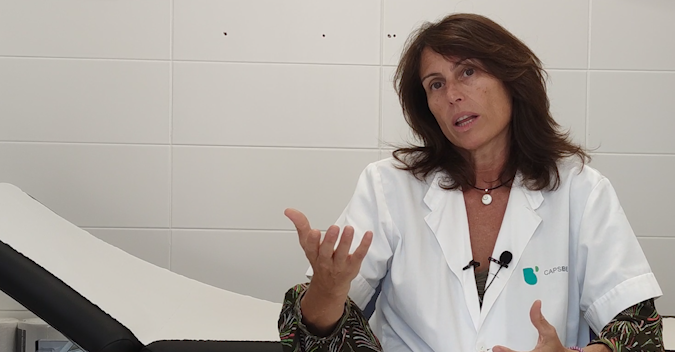“Digital health has been and will continue to be key, especially in the field of telemedicine”
30 of May of 2022
This week we were able to talk about the state of digital health with Mireia Sans, a member of the committee of experts at the TIC Salut Social Foundation’s Mobile Apps Certification Service. Sans has a degree in medicine and surgery from the University of Barcelona and specialises in family and community medicine. Ph.d cum laude and care manager at Comte Borrell Primary Care Centre, CAPSBE. She is also president of the eHealth doctors section of the Official Medical Association of Barcelona and a lecturer at the International University of Catalonia.
We talked about managing big data to support clinical decision-making and the current state of remote care and she told us the following:
- Where has digital health been headed since the outbreak of the COVID-19 pandemic?
It is very important to assess and identify the strategies that add value to citizens and the health system.
Digital health has been and will continue to be key, especially in the field of telemedicine. This is care we provide remotely using ICT, which we must continue to consolidate. We need to provide professionals with training so they develop certain skills. Institutions also need to be equipped with the right tools to be able to provide this care service adapted to the digital world. It is also important to be able to inform patients properly.
Evaluation is required too. We need to properly evaluate all of these tools so they provide real value, not only to the public but also to professionals in clinical care practice. It is important to have valid and reliable tools in terms of cost-effectiveness. And we need to review the different care processes and doctor-patient relationships to adapt or rethink them, taking the new tools into account.
- Has the use of digital tools by professionals increased in the last two years?
Yes. The crisis caused by COVID-19 clearly accelerated the entire process of digitising health. Especially during lockdown. Interaction with patients and their families was performed using technology. Remote care has increased through telephone calls, video calls and online consultations. Everything we mean when we think of telemedicine. Only patients who required a physical examination or who had acute respiratory symptoms were attended to in person.
Professionals got used to providing remote care out of necessity. Now it is up to us to give it a useful and non-indiscriminate meaning. We should differentiate between the need in each case to decide whether to offer face-to-face care or whether it can be performed remotely through technology. With this aim in mind, the Department of Health has created a set of usage recommendations by professionals and institutions that make it possible to discern appropriate uses, regulations and good practice for these tools. The Medical Association has also created a handbook for good telemedicine practice.
- And among the public?
Use of such tools has also been increasing and not only among young people. In consultations we see how elderly people have learned to use mobile phones, apps and the official health service app with the help of their children and even grandchildren. This avoids travel, eliminates or reduces waiting time, aids access to health services regardless of geographical location, and allows problems of low complexity to be addressed…
- What obstacles do you encounter in the process of patients adopting digital tools?
We find these obstacles among both patients and professionals. There is resistance to change. Getting outside of your comfort zone and stopping doing something that has worked up until now: “We have been doing this all our lives, so why do we have to change now?” But when you think about it, digital health avoids waiting times and travel and can deal with cases of low complexity. If the case cannot be resolved through this channel, a professional will refer you for a face-to-face visit.
Another obstacle is difficulties with communication and expression when there is a technological tool in the middle: the digital divide due to inequalities or economic, social, age and/or cultural factors.
- How much remote care do you provide at CAPSBE?
We had begun a digital health project together with the TIC Salut Social Foundation on chronic bronchial pathology, which was slowed down by the pandemic. At the moment, the most developed aspects are telemedicine and online consulting, telephone support and video-consultation tools. The latter was the most difficult to implement.
Participation in the TIC Salut Social Foundation’s Committee of Experts
We discussed the TIC Salut Social Foundation’s Certification Service. One of the questions we asked her was about her role as a member of the Committee of Experts. This is what she told us:
-
We need to properly evaluate all of these tools so they provide real value, not only to the public but also to professionals in clinical care practice


